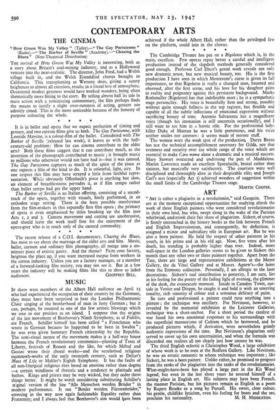MUSIC
IF there were members of the Albert Hall audience on April 15 who had experienced the occupation of their country by the Germans, they must have been surprised to hear the London Philharmonic Choir singing of the brotherhood of man in lusty German ; but it can, perhaps, be counted as one of the few artistic blessings which we owe to our position as an island. I suppose that the origins of the last movement of Beethoven's Ninth Symphony, as of Fidelio; are French. Schiller himself has been called " a Frenchman who wrote in German because he happened to be born in Swabia " ; he was even given honorary French citizenship, by the Republic. The semi-ritual nature of the movement makes it a half-way house between the French revolutionary ceremonies—planting of Trees of Liberty, festivals of Reason and the like, for which Mehul and Gossec wrote their choral works—and the secularised religious mammoth-works of the early twentieth century, such as Delius's Mass of Life or Mahler's Eighth Symphony. It has the faults of all non-liturgical religious rites based on emotion rather than dogma —a certain windiness of rhetoric and a tendency to platitude and bathos. Kings and priests may be very wicked, but they order these things better. It might be worth considering substituting Schiller's anginal version of the line "Alle Menschen werden Briider " in modem performance. It ran " Bettler werden Ffirstenbrfider," stressing in the way now again fashionable Equality rather than Fraternity; and I always feel that Beethoven's aim would have been
achieved if the whole Albert Hall, rather than the privileged few on the platform, could join in the chorus.
The Cambridge Theatre has put on a Rigoletto which is, in the main, excellent. Few operas repay better a careful and intelligent production instead of the slapdash methods generally considered good enough. Professor Carl Ebert's genial work reveals not only new dramatic sense, but new musical beauty, too. His is the first production I have seen in which Monterone's curse is given its full importance, so that Rigoletto is really a changed man, haunted and obsessed, after the first scene, and his love for his 'daughter gains in reality and poignancy against this persistent background. Marko Rothmuller (Rigoletto) has that indefinable asset ; he is a sympathetic stage personality. His voice is beautifully firm and strong, possibly without quite enough fullness in the top register, but flexible and capable of all the subtle inflections of emotional expression without sacrificing beauty of tone. Antonio Salvarezza has a magnificent voice (though his intonation is still uncertain occasionally), and I still want to see him in a heroic role. For the professional lady- killer Duke of Mantua he was a little portentous, and his voice neither smiles nor caresses : it seems made of sterner stuff.
The women were the weak spot of the production. Darya Bayan has not the technical accomplishment necessary for Gilda, nor that evenness and security over tic whole range of the voice which are essential to make Caro name alone a dramatic and a musical success. Mary Stewart overacted and undersang the part of Maddalena. Martin Lawrence made an excellent Sparafucile, brutal rather than sinister, but musically very satisfactory. The courtiers were well disciplined and thoroughly alive in their despicable role; and Joseph Carl's sets (especially Act 3) achieved wonders of suggestion within the small limits of the Cambridge Theatre stage.
MARTIN COOPER.


































 Previous page
Previous page